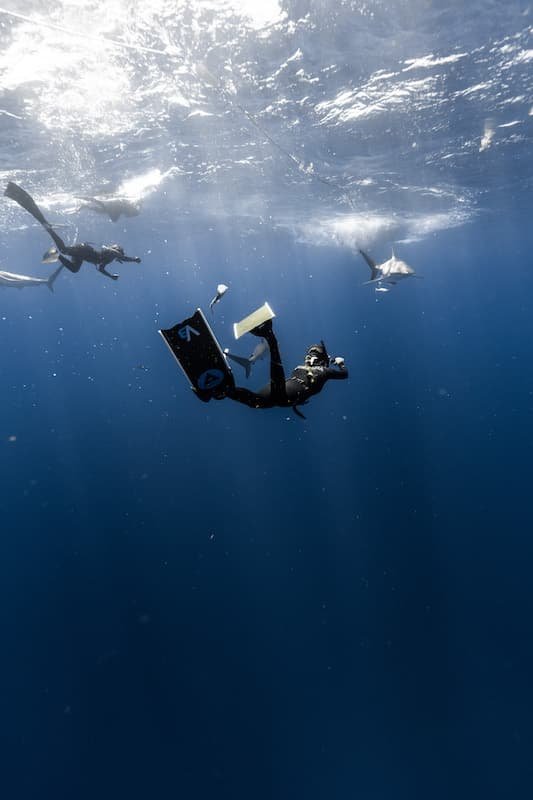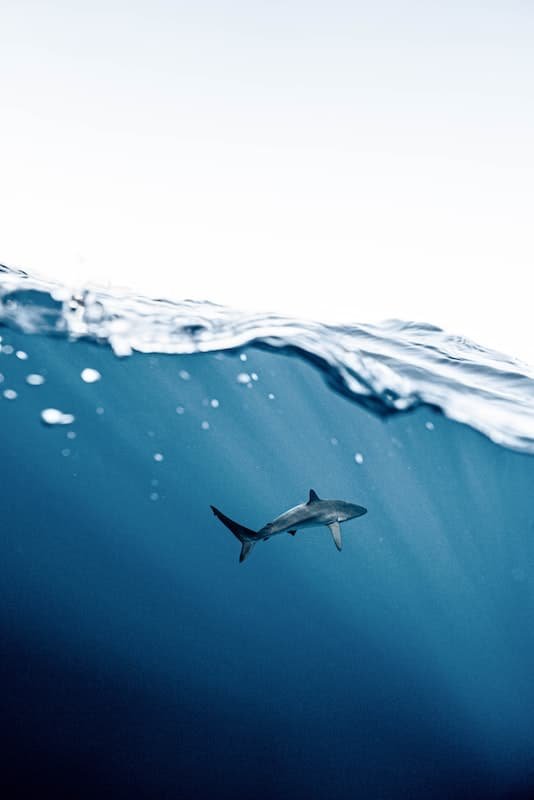
 Nick Pelios
Freediver, Creator
Nick Pelios
Freediver, Creator

 Nick Pelios
Freediver, Creator
Nick Pelios
Freediver, Creator
Swimming alongside sharks can be a source of both exhilaration and terror, depending on one's prior knowledge and background with these creatures. To help ensure a safe and enjoyable experience while freediving with sharks, consider the following tips.
Sharks prey on sea animals that are either dead or dying, such as fish, turtles, whales, and even their own kind. Creatures that are wounded often exhibit telltale signs of distress through erratic movements and splashing. This splashing, coupled with the flashing of hands or fins, can attract sharks. To ensure safe and non-threatening interactions when freediving with sharks, it's best to move as stealthily as possible through the water. This approach will allow for more natural encounters, minimizing the risk of unwanted attention from these majestic predators.

This advice is particularly relevant to those who engage in spearfishing while freediving. Sharks can detect the smell of dead fish in the water and are often drawn to the scent of blood. In certain parts of the world, spearfishermen attach their catch to their waist, but this practice is not universally safe and is generally discouraged. If you spear a fish, it's best to remove it from the water as soon as possible, regardless of whether or not a shark is in the area. If you find yourself surrounded by sharks at the surface with freshly speared fish, hold the catch out of the water above you. If that's not feasible, keep the fish concealed and close to you while your dive buddy assists in escorting you back to the boat. In most cases, if sharks see that you can defend your catch and keep it out of their line of sight, they may lose interest and allow you to escape unscathed. Keep in mind that every interaction with a shark is unique, so there is no universal guideline for what to do in this scenario. It's important to be aware of your options so that you can adapt them to fit the specific encounter.

Sharks are stealthy ambush predators, relying on surprise to catch their prey. Tiger Sharks and Bull Sharks are known to approach their targets from behind, using this tactic to gain an advantage. If you find yourself in the water with multiple sharks, try to determine how many there are and where they are located. Unless you are freediving in an area known for shark diving, it's unlikely that you will encounter more than 3-8 sharks at once, without provocation. Maintaining awareness of the sharks' location at all times is crucial to ensuring a safe and enjoyable freedive.
It is important not to try to escape from a shark by swimming away from it. Even though it may seem like a natural reaction, swimming away can actually attract the shark toward you. The splashing and movement in the water may entice the shark to approach, bump, or even bite. Instead, it is crucial to remain calm and keep your arms close to your body, ready to redirect the shark if necessary. Some people prefer to fold their arms or put them behind their back, but it is also helpful to adopt a praying or boxer defense position, which allows for a quick release of the hands to push away the shark. In addition, using your fins to create distance between yourself and the shark can also be effective.

Sharks are considered apex predators, meaning they are at the top of the food chain in the ocean. As they are not accustomed to being challenged by other creatures, they typically have a fight-or-flight instinct when threatened. It is important to avoid provoking a shark by trying to force interaction with it as this may deter the shark from wanting to be near you. As sharks do not have hands, they use their mouths to defend themselves from harm. If provoked, a shark may bump or bite whatever is causing the threat as a form of self-defense. Actions such as grabbing, poking, touching, riding, or chasing a shark should be avoided to ensure safe and peaceful interaction with these animals.
In conclusion, freediving with sharks can be an exciting and unforgettable experience, but it's important to approach it with caution and respect for these apex predators. Knowing the behavior of sharks and how to interact with them safely can help prevent any unwanted incidents. Always be aware of your surroundings, avoid provoking the sharks, and stay calm if approached. Remember, we are guests in their habitat, and it is our responsibility to minimize any negative impact on their natural behavior. With these tips in mind, you can enjoy the beauty and wonder of swimming with sharks while keeping yourself and the sharks safe.